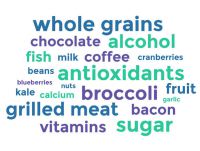About-cancer/causes-prevention/risk/diet/zh
Jump to navigation
Jump to search
飲食
許多研究已經研究了特定飲食成分或營養素與癌症風險增加或降低相關的可能性。 在實驗室和動物模型中對癌細胞的研究有時提供了證據,表明分離出的化合物可能具有致癌性(或具有抗癌活性)。
但是,除了少數例外,對人類的研究尚未明確表明任何飲食成分都會導致或預防癌症。 流行病學研究的結果有時會比較患有和沒有癌症的人的飲食,這表明患有和沒有癌症的人在特定飲食成分上的攝入有所不同。
但是,這些結果僅表明飲食成分與癌症風險的變化有關,而不是飲食成分引起或引起風險的變化。 例如,患有和沒有癌症的研究參與者除了飲食外,可能在其他方面也有差異,並且可能有其他差異解釋了癌症的差異。
從流行病學研究中發現飲食成分與癌症風險降低相關的證據時,可以進行隨機試驗以驗證這種可能性。 飲食組的隨機分配可確保高營養素攝入量和低營養素攝入量之間的任何差異均歸因於營養素本身,而不是其他未發現的差異。 (出於道德原因,當有證據表明飲食成分可能與罹患癌症的風險增加有關時,通常不會進行隨機研究)。
科學家研究了許多添加劑,營養素和其他飲食成分,以期可能與癌症風險相關。 這些包括:
- 丙烯酰胺
- 丙烯酰胺是煙草煙霧和某些食物中的化學物質。 當某些蔬菜(例如土豆)加熱到高溫時,可以生產這種產品。 動物模型研究發現,丙烯酰胺暴露會增加幾種癌症的風險。 但是,沒有一致的證據表明飲食中攝入丙烯酰胺與人類罹患任何類型癌症的風險有關。 有關更多信息,請參見丙烯酰胺和癌症風險情況說明書。
- 醇
- Although red wine has been suspected of reducing cancer risk, there is no scientific evidence for such an association. Also, alcohol is a known cause of cancer. Heavy or regular alcohol consumption increases the risk of developing cancers of the oral cavity (excluding the lips), pharynx (throat), larynx (voice box), esophagus, liver, breast, colon, and rectum. The risk of developing cancer increases with the amount of alcohol a person drinks. For more information, see the fact sheet on Alcohol and Cancer Risk.
- Antioxidants
- Antioxidants are chemicals that block the activity of other chemicals, known as free radicals, that may damage cells. Laboratory and animal research has shown that exogenous antioxidants can help prevent the free radical damage associated with the development of cancer, but research in humans has not demonstrated convincingly that taking antioxidant supplements can help reduce the risk of developing or dying from cancer. Some studies have even shown an increased risk of some cancers. For more information, see the Antioxidants and Cancer Prevention fact sheet.
- Artificial sweeteners
- Studies have been conducted on the safety of several artificial sweeteners, including saccharin, aspartame, acesulfame potassium, sucralose, neotame, and cyclamate. There is no clear evidence that the artificial sweeteners available commercially in the United States are associated with cancer risk in humans. For more information, see the Artificial Sweeteners and Cancer fact sheet.
- Calcium
- Calcium is an essential dietary mineral that can be obtained from food and supplements. Research results overall support a relationship between higher intakes of calcium and reduced risks of colorectal cancer, but the results of studies have not always been consistent. Whether a relationship exists between higher calcium intakes and reduced risks of other cancers, such as breast and ovarian cancer, is unclear. Some research suggests that a high calcium intake may increase the risk of prostate cancer. For more information, see the fact sheet on Calcium and Cancer Prevention.
- Charred meat
- Certain chemicals, called HCAs and PAHs, are formed when muscle meat, including beef, pork, fish, and poultry, is cooked using high-temperature methods. Exposure to high levels of HCAs and PAHs can cause cancer in animals; however, whether such exposure causes cancer in humans is unclear. For more information, see the Chemicals in Meat Cooked at High Temperatures and Cancer Risk fact sheet.
- Cruciferous vegetables
- Cruciferous vegetables contain chemicals known as glucosinolates, which break down into several compounds that are being studied for possible anticancer effects. Some of these compounds have shown anticancer effects in cells and animals, but the results of studies with humans have been less clear. For more information, see the Cruciferous Vegetables and Cancer Prevention fact sheet.
- Fluoride
- Fluoride in water helps to prevent and can even reverse tooth decay. Many studies, in both humans and animals, have shown no association between fluoridated water and cancer risk. For more information, see the Fluoridated Water fact sheet.
- Tea
- Tea contains polyphenol compounds, particularly catechins, which are antioxidants. Results of epidemiologic studies examining the association between tea consumption and cancer risk have been inconclusive. Few clinical trials of tea consumption and cancer prevention have been conducted and their results have also been inconclusive. For more information, see the fact sheet on Tea and Cancer Prevention.
- Vitamin D
- Vitamin D helps the body use calcium and phosphorus to make strong bones and teeth. It is obtained primarily through exposure of the skin to sunlight, but it can also be obtained from some foods and dietary supplements. Epidemiologic studies in humans have suggested that higher intakes of vitamin D or higher levels of vitamin D in the blood may be associated with a reduced risk of colorectal cancer, but the results of randomized studies have been inconclusive. For more information, see the Vitamin D and Cancer Prevention fact sheet.
